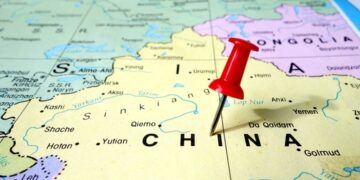The United Nations Institute for Disarmament Research (UNIDIR) has issued a report that examines the lack of a comprehensive institutional framework within the United Nations to address maritime security challenges.
The “Securing the Seas: A Comprehensive Assessment of Global Maritime Security” report by UNIDIR has provided a mapping of the global governance of maritime security and outlined the established and emerging challenges that fall under this agenda. The United Nations is approaching the oceans and marine environment in an increasingly encompassing process under the sustainable development and economic and social affairs agenda, including through UN-Oceans.
However, the same cannot be said for the United Nations architectures on peace and security and human rights. Peace and security and human rights are not adequately featured in the UN-Oceans processes, nor have the respective architectures found a structured way to engage with maritime security in a coherent and holistic manner. Consequently, large parts of the United Nations architecture remain ‘sea blind.’
The acceleration of maritime activities, humanity’s growing dependency on the seas, and the sheer scale of established and emerging maritime security challenges call for more structured and sustained efforts to address maritime security within the United Nations system.
The report proposes structuring this process in four layers:
- Developing scenarios for a dedicated United Nations body on maritime security.
- Working towards global integrated assessments of maritime security structures and challenges.
- Systematically addressing norm deficits in existing institutions and considering new legal instruments.
- Revitalizing regional seas agreements to incorporate maritime security.
As the report has shown, the United Nations lacks an institutional structure to address maritime security comprehensively. Neither the General Assembly’s ocean affairs and law of the sea process, the selected focus of the Security Council, nor the assemblies of the United Nations agencies proactive in maritime security, such as the IMO or UNODC, have a sufficient mandate or legitimacy on their own to deal with maritime security challenges comprehensively and to bring strategic coherence to the United Nations’ efforts. The need for developing a better comprehensive structure has already been noted and observed, for instance, in the Security Council’s debate on maritime security of 2021.
Mainstreaming maritime security across the United Nations system
The report identifies the need for an institutional mechanism to address the task of more effectively mainstreaming maritime security across the United Nations system. This entails ensuring that the maritime domain is substantially considered in the crisis prevention or peacebuilding architecture, as well as in more specific workstreams on human rights, disarmament, cybersecurity, and space security. Expertise on naval matters and maritime law enforcement should also be more fully integrated into the United Nations’ ocean governance processes – such as UN-Oceans, SDG 14, and the agreement on the Conservation and Sustainable Use of Marine Biological Diversity of Areas Beyond National Jurisdiction – as well as into the broader biodiversity and climate change regimes.
Improving coherence and coordination
Additionally, the report highlights the need for greater coherence, mutual learning, and transfer of best practices across regions and maritime security issues. This includes harmonizing the work of the five main United Nations agencies at the strategic and policy levels, ensuring mandates such as ‘marine safety,’ ‘port security,’ ‘fisheries control,’ ‘crime prevention,’ and ‘border management’ are considered as integrated parts of maritime security rather than separate functions. Such harmonization will improve the effectiveness of capacity-building and technical assistance, while avoiding duplication and overlap. It also implies enhancing the relationship between United Nations initiatives and those undertaken on bilateral, minilateral, or regional levels.
Strengthening legal frameworks and regional mechanisms
Furthermore, the report emphasizes the importance of facilitating comprehensive assessments, advancing legal norms and common standards, and institutionalizing regional maritime security regimes to establish more robust structures for maritime security.
Recommendations for institutional mechanisms
The report recommends that any such mechanism should gain legitimacy from both the Security Council and General Assembly. It proposes that the Secretary-General convene a high-level panel on security at sea to develop concrete options for institutional arrangements, addressing legal gaps, and mainstreaming maritime security across the United Nations system.
Potential scenarios outlined by the report include establishing a ‘United Nations Office on Maritime Security’ within the Secretariat, as a subsidiary body to the Security Council, or as an independent entity. The United Nations Global Counter-Terrorism Coordination Compact could serve as a role model for developing comprehensive structures. A special representative could also be appointed, and global maritime security efforts could be strengthened by integrating this work stream into the mandates of UN-Oceans or DOALOS. Additionally, the report suggests creating a United Nations trust fund on maritime security to ensure coordinated technical assistance and capacity-building while avoiding competition among agencies for donor funding.

































































